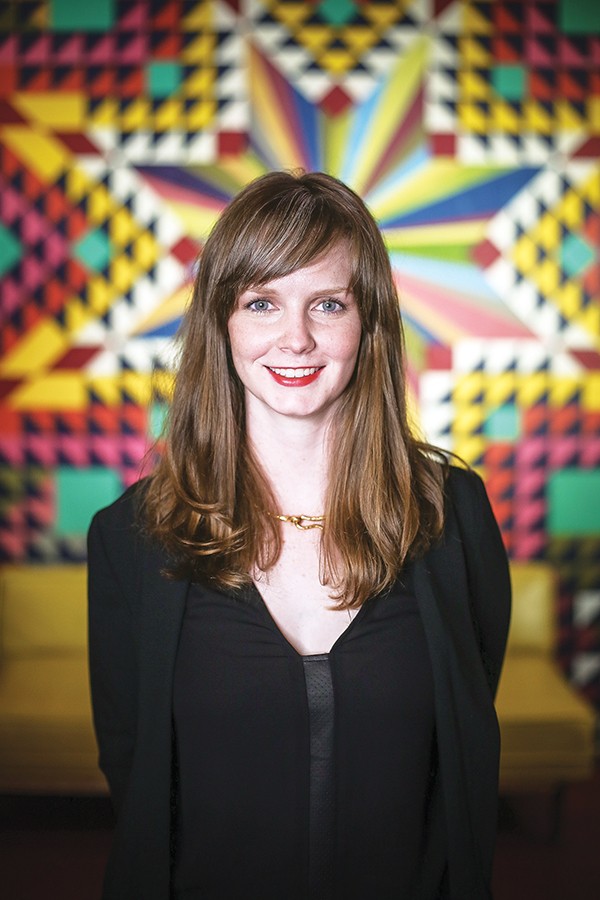Lauren Kennedy, executive director of the UrbanArt Commission (UAC), says although the coronavirus pandemic has hit artists hard, the organization has more than a dozen projects in the works.
Kennedy, who says public art is a critical asset for communities — especially Memphis because of its “rich culture” — discusses how the pandemic has affected the UAC and artists and how the organization is moving forward. — Maya Smith

Lauren Kennedy, executive director of the UrbanArt Commission
Memphis Flyer: How has the pandemic affected the UAC as an organization?
Lauren Kennedy: Nonprofits all across the country are hurting badly. We were fortunate though, as we were in a better place than a lot of folks at the end of the fiscal year. Looking ahead is a little different though. This will probably be a really hard year for fundraising.
MF: How has the pandemic affected UAC’s commissioning of artists?
LK: The work has really taken off in a more intense way. Everything feels more urgent right now. As soon as the pandemic hit, we knew the biggest priority was keeping projects moving along to keep payments going to artists.
Artists are among a number of folks being hit hardest by coronavirus. A recent report said nationally 62 percent of artists are unemployed and 95 percent have lost income. That’s really significant. So we moved some timelines up and reallocated some funding to create more opportunities to get money to artists. Public art is one vehicle to take care of these folks.
Art is often the first thing on the chopping block. But art is critical for any place to thrive and be vibrant. I think it’s easier for people to say that art is valuable and forget that artists are the reason that the art exists. We talk about art as an abstract concept apart from the artist doing the work. We need to reorient our conversations around art to put the priority on the people making it.
MF: Has the pandemic changed the way the UAC engages the community?
LK: In March, we were pushing ourselves to engage the community where two projects would go: Whitehaven and Raleigh. We were planning to have public meetings before the artists were selected to bring the public in sooner and let them vote on proposals. When we first all went into quarantine, we knew we couldn’t do that as we intended so we turned it into a virtual thing.
We look forward to engaging people in person again, but in the meantime we are thinking about how virtual spaces open up more opportunities to participate for those who can’t attend meetings in person.
MF: Why is it important for public art to continue?
LK: Art is something we pass down to future generations. Memphis has always been a culturally rich place, and I think art is a big part of that. And public art is even more valuable right now since people can’t go and experience other forms of art. But public art has always been important because it’s accessible. People don’t have to walk through a marble entranceway to see it. Hopefully, now public art means more to people since COVID has changed the way we experience art.
MF: What projects does UAC have in the works?
LK: We have over 20 projects in the works. We just commissioned five artists for a new project at the airport. They’ll be in the new Concourse B. They’re all local artists, so we’re excited about that. The artists commissioned to do projects at the new convention center are in fabrication mode, and one of the murals will be installed before the end of the month. We’ve also got a mural project in Gooch Park through the Neighborhood Art Initiative program.
MF: What are some of the UAC’s priorities moving forward?
LK: One thing we are thinking about is how do we push ourselves to be responsive to whatever happens in front of us. This not only applies to COVID but also the murders of Ahmaud Arbery, Breonna Taylor, and George Floyd. How do we pay more attention to what’s happening around us? We want to create platforms for artists to respond to these things. How does justice show up in our work in a way it hasn’t in the past? That’s something we, as a team, will spend some time thinking about in the coming months.
MF: Anything else you’d like to add?
LK: We’re going to get through this together. And we want to be a part of this togetherness.